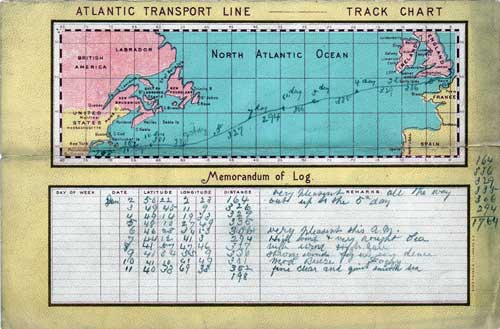Gambling and Parimutuel Betting Pools on Ocean Liners
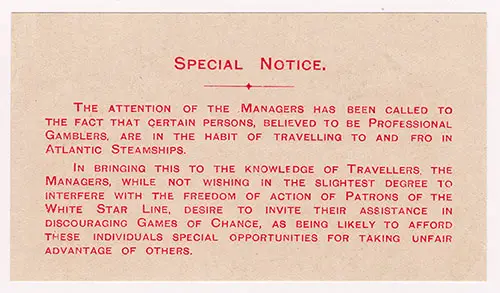
White Star Line Special Notice Waring Passengers of Professional Gamblers. Insert in the SS Arabic Second Class Passenger List dated 11 June 1909. GGA Image ID # 17b29ae866
Gambling on Ocean Liners
Among the better class of travelers who yearly cross the ocean, the question has repeatedly arisen, and very naturally too. Why Is It that gambling is so openly allowed and so openly encouraged, as it unquestionably is, by the steamship companies in the smoking-rooms of the first-class Atlantic steamers?
It is a well-known fact, at least among all the officers connected with the ships, that during the travelling season—from May to November—the Atlantic steamers are the resorts of professional gamblers from all parts of the United States, whose sole object in crossing the ocean is to come in contact with men whom under no other conditions or circumstances they would ever be likely to meet.
In dress and appearance they so closely resemble gentlemen of refinement that their unsuspecting fellow-passengers are quickly and easily deceived.
On one of my summer voyages from New York there came on board the " Ger manic " two men from the West or South—Texas, I believe.
For a few days they lounged about in the smoking-room, now watching one table of players, then strolling to another, appearing to watch the games more for the lack of something better to do than because they really took an interest in them.
Several invitations were extended to thorn to take a hand, but they Invariably declined, making some remark about " want of practice " or " ignorance of the game."
On the fourth day out the younger of the two appeared to rouse himself from his listlessness and apparent indifference, declaring that he "didn't mind if he tried his luck."
He played and lost; played and lost again. His companion made no comments but waited and watched silently. On the day following the game was renewed, the second then agreeing to play.
They swept everything before them. During the first four days both had been keenly studying the play of all who were gambling at the different tables and had laid their plans accordingly.
When these were perfected, the men were ready for action. How many hundreds of dollars went into their pockets I was unable to learn: but the stakes were high, and it was no inconsiderable amount which they carried away with them when leaving the ship at Liverpool.
A young man, a graduate of one of the Western colleges, came on board alone in New York for the purpose of crossing the ocean to Join his parents in London.
Just before leaving the city, after purchasing his ticket for the steamer, he drew from his father's banker £100 In English money, more than sufficient, of course, to defray all incidental expenses.
Not more than twenty-four hours had elapsed when I was informed that the young fellow was playing poker in the smoking-room with men whose reputation as professional card-players was well established on board the "Germanic."
I knew his father well, and my first Impulse was to send for the young man and expostulate with him. But when I considered that I had no authority to prevent gambling, I concluded that It was better for me to remain silent, and I did so.
According to the established rule of the fraternity when an inexperienced player falls into their hands, they allowed the lad—for he was little more than that—to win the first two or three games.
This so elated him that he became reckless and increased the stakes. Then the tables were turned, and the men literally robbed him of every penny that he had in his possession.
In order to reach London it was necessary for him to borrow a sufficient sum to pay his expenses. He was fortunate enough to find a gentleman among the passengers who was willing to advance him the amount required. I could cite hundreds of such cases were It requisite to do so.
Those two illustrations, however, are sufficient to enlighten the uninitiated as to the prevailing in fluences that exist in the smoking-rooms of the first-class ocean steamers.
According to the advertisements issued by the steamship companies, the smoking-room is intended for the comfort and convenience of all male passengers who wish to enjoy a pipe or cigar while crossing tho ocean.
Smoking in any other part of the ship, except on deck in the open air, is strictly prohibited, and rightly, too.
This room, therefore, is the only place where in rainy or windy weather a passenger can with any satisfaction indulge in a smoke. Repeatedly have I known circumstances like the following to occur.
A gentleman of refined tastes, perhaps a clergyman, wishing to enjoy a cigar and at the same time occupy himself in reading, goes into the smoking-room.
The tables are occupied by card-players, most of them gamblers. Not desiring to come in contact with this class of men, who takes a seat as remote from them as possible, opens his book, and endeavors to concentrate his thoughts on the subject before him.
He is scarcely seated when low mutterings proceed from one of the players, who is evidently not on the winning side.
He pays no attention to them beyond making an effort not to hear. Voices rise higher and higher. Coarse, vulgar, abusive language, mingled with oaths, is shouted across the room.
Rising from his seat, the thoroughly disgusted traveler thrusts into his pocket the book he has been attempting to read, throws away his cigar, and rushes indignantly on deck, wondering why it is that the smoking-room is allowed to be monopolized by the lowest class of men that cross the Atlantic, and that no accommodation whatever is furnished for passengers of different tastes and habits.
One of my old passengers came to me on a certain voyage, when there happened to be an unusually large number of gamblers on board, and I saw that he was laboring under great excitement.
"Captain," said he, "it is disgraceful, outrageous, that these men should be permitted to take full possession of the smoking-room, and force those who have some self-respect out on deck. Can't you do something!
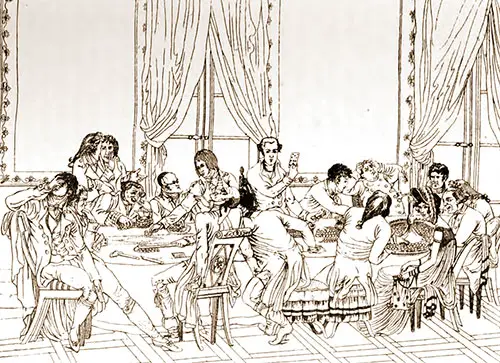
La Bouillotte (French card game). | GGA Image ID # 17b208ef2b
Can't you prevent it? " The only satisfaction that I could give him was that I could do nothing whatever, as no authority had been given me; gambling not being prohibited by the company.
I added, however, that if a complaint were entered at the office In Liverpool, some benefit might result from it.
I have reason to suppose that this was done, as, a voyage or two later, a small placard was put up in the smoking- room bearing words to this effect: "Gentlemen are respectfully requested not to play for high stakes."
The "gentlemen" to whom this notice was addressed, if they saw it at all, laughed, shrugged their shoulders, and played for what stakes best suited them.
One form of gambling on the large steamers is betting on tho number of miles made by the ship every twenty-four hours. The excitement attending it is beyond description.
Now that the competition between the "Teutonic," of the White Star Line, and the " City of Paris " and the " City of New York," of the Inman Line, is so great, it is well known that many of the passengers who have large sums at stake find it wholly impossible to sleep at night owing to the intense strain upon their nervous system.
Passengers crossing on board my ship have resorted to every device for obtaining some information regarding the number of miles run. In the most persuasive and insinuating manner bribes have been offered to the officers and men, and every inducement has been held out to them for giving a " tip." Whether or not this has ever been obtained I am unable to say.
So averse have I been to this detestable trickery that I have never permitted any gentleman who made a practice of betting on the runs to enter my chartroom.
An incident occurred on one of my voyages which served to strengthen this resolution on my part, and I never deviated from it.
An Englishman, who had come on board bearing a letter of Introduction to me from one of the managers of the White Star Line, was in the habit of coming to me every morning after breakfast, as I stood smoking my pipe by the wheelhouse door and having a few moments' chat on various subjects: the speed of the ship not being one of them.
That he was betting heavily on the runs was a fact of which I was in total ignorance. By a strange coincidence, for three successive days he was the winner of the pool.
A syndicate had been formed and had bought up what it was believed would be the winning numbers. The disappointed holders became furious in their indignation and anger.
Discussing the affair in the smoking-room, one of the parties insinuated that the fortunate individual had received the " tip " from the captain and threatened " to make it hot" for me. For several days I remained entirely unconscious of the excitement existing among the betting men.
A gentleman who had crossed with me a number of times then kindly informed me what had taken place and said that he feared there would be trouble.
Wishing to have a public interview with the persons who were going to " make Ii hot " for me, I kept the runs back for two days, and the passengers in complete ignorance of the distance made by the ship. The result fully equaled my anticipations.
After luncheon on the second day a number of the gentlemen came to me, wishing to know the cause of such an extraordinary movement on my part.
I replied that I would meet all interested in the affair at three o'clock in the smoking-room. I was punctual to the moment, and found, as I expected, the room filled with passengers.
I demanded that a thorough investigation should at once be made, and the result was that, when the matter was sifted to its foundation, it turned out that the men who had made the accusation and caused the disturbance were a party of professional gamblers from Chicago
Why is the gambling permitted?
The question is one that with a moment's consideration can be easily answered. All Atlantic passenger steamers are furnished with a large supply of wines and liquors, which are not included in the price of passage.
Men who gamble drink; and largely, too. The profits derived from the sale of these wines and liquors during the travelling—or, I may say, the gam bling—season are so great that it is not to the interest of the steamship companies to abolish gambling, or to interfere in any way with the comfort and enjoyment of a class of passengers who so materially add to their income. Chas. Wm. Kennedy, late commander White Star steamer " Germanic."
Chas. Wm. Kennedy, “Notes and Comments II. Gambling on Ocean Steamers,” in The North Atlantic Review, New York: No. 3 East Fourteenth Street, Vol. 150, No. 6, Whole No. CCCCIII, June 1890, pp.780-782.
ROULETTE
Roulette was first heard of at the end of the eighteenth century and was then of two kinds.
There was the German apparatus, which had only eighteen divisions. Two of this latter, placed opposite to each other, had little ivory knobs affixed to them; if the ball fell into one of these, say noir, the banker drew in all the red, while the players on the other noirs were allowed to withdraw their stakes, neither winning nor losing. According to the event, the ball fell into any of the other rouges or noirs, the banker paid or drew in the stakes.
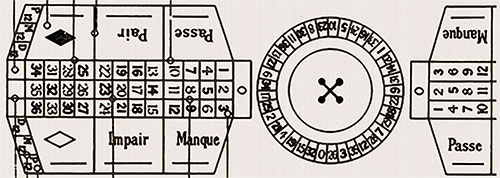
Diagram of a Roulette Table circa 1900. GGA Image ID # 17b169c3ca
The other kind of roulette, the French, is the one now in use, having altogether superseded the German. Its construction is well known, but we shall have occasion to speak of it farther on.
One would think that with a wheel, constructed as the roulette is, and as we see it now at work at Monte Carlo, fraud would be impossible.
However, when it was first introduced into the country, and there were more than twelve tables in full work in the neighborhood of St. James's alone, the French sharpers who kept them resorted to an infamous trick.
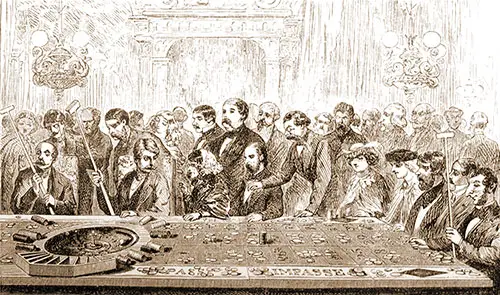
The Old Rhine Gaming Table. GGA Image ID # 17b19ecd62
The tables were made to act with a spring, which was managed with the foot, and by which means the director could make a zero whenever he pleased and thus sweep in all the stakes on numbers, columns, etc.
Another trick, which was an American invention, was to have the wheel so constructed that by pressing a knob hidden under the table, the copper partitions between the numbers could be made to open to an extent imperceptible by the unsuspicious looker-on.
If the croupier, turning the wheel, saw that the highest stakes were on rouge, he would work the mechanism so as to enlarge the noir divisions and thus cause the ball to fall into one of them, thus securing the larger stakes on rouge.
If the larger sums were staked on noir, he would, of course, work the wheel so as to send the ball into rouge.
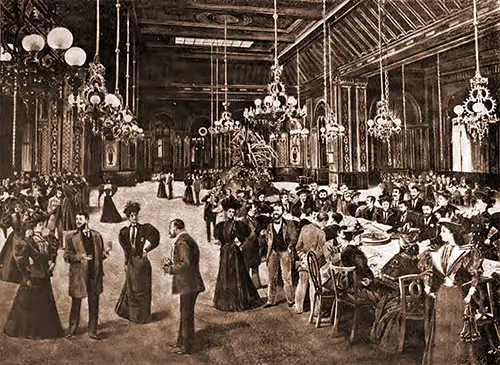
The Salle de Jeu -- Game Room at Monte Carlo. GGA Image ID # 17b19f2243
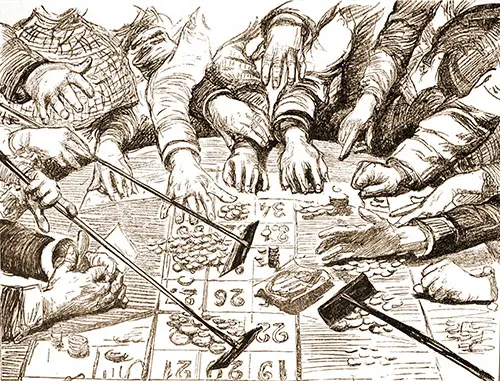
Winners Scooping the Table. GGA Image ID # 17b1b2f65d
Parimutuel Betting Pools on a Steamship
THE POOL OF THE SHIP'S RUN
There are two kinds of pools on the ship's run, which are made up in the smoking-room.
The simpler variety is known as "Hat Pool" because the drawing is done from a hat or cap. The smoking-room steward prepares papers like a ballot numbered 1, 2, 3, 4, 5, 6, 7, 8, 9, and 0. Ten take part in the pool by paying ten shillings or $2.50 each.
This entitles them to draw a number from the hat. The one who draws the number, which coincides with the last figure of the ship's run in sea miles at the time when the log is taken at noon the next day, gets the entire sweepstakes.
Thus, if the run were 568 miles, the one who drew No. 8 would win $25.00. It is customary for the winner to give ten percent of his winnings to the smoke-room steward who arranges the details of the drawing.
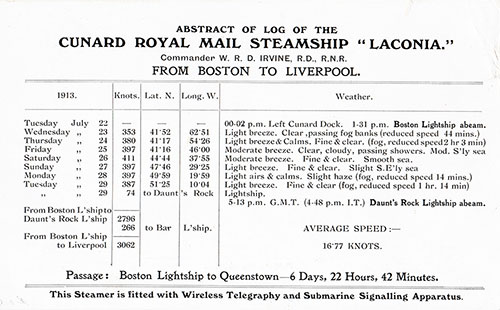
Abstract of Log of the Cunard RMS Laconia from Boston to Liverpool, 22 July through 29 July, 1913. (Knots=Sea Miles). GGA Image ID # 17b2c44994
Auction Pool
The "Auction Pool" is more complicated. It is more interesting in a way, as the players really hid against the actual run. Twenty people get together and pay twenty shillings for the privilege of drawing a number blindly from a hat, the numbers running from say 540 to 560, or in other words, from 540 to 560 sea miles based on the captain's calculation, which is asked from him by courtesy.
After the first drawing has been done by the original members of the pool, each number is auctioned off by someone who is appointed as auctioneer. Each of the original members of the pool who have paid their twenty shillings must enter the competition if they wish to retain their number.
They can also compete for any other number. The bidding is apt to be brisk, and when the number is knocked down, one-half of the money paid goes to the original member of the pool who drew the number which was contained in the hat, and the other half goes in the pool.
If the original owner of that number bids his own number back, he has to pay one-half of his bid to the pool. When all the numbers have been auctioned off, they put to auction what is called the "high field" and the "low field."
The "high field" includes all the numbers above the highest number which has been auctioned in the pool; thus, to go back to our 560, everything above 560 should be in the "high field." The "low field" includes all the numbers below the lowest number of the pool; thus, 539 would belong to the "low field."
These two fields, high and low, usually sell for a high price at the auction. The pool is always arranged for the evening before the run of the ship at the time when the log is made at noon.
The captain's calculations may be correct, provided the conditions of weather, etc., remain the same as when the guess was made.
Here, however, comes in the element of chance: if headwinds, heavy seas, or fog are encountered, a low field would be run: but if clear weather, fair winds should predominate, the result would be entirely different, and the ship might run ahead of the sea miles which the captain guessed.
The successful holder of the winning number is entitled to the entire pool, which is always a matter of hundreds of dollars, and it is not unusual for the pool to be worth as much as $5,000. Sometimes a certain percentage of this is given to the charity for the widows and orphans of seamen of the line.
Memorandum of Log Filled in by Passenger on the SS Marquette of the Atlantic Transport Line, 1899. GGA Image ID # 17b3769d16

